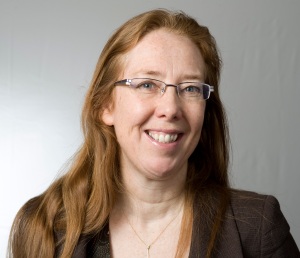July 18, 2012
by Hazel Hall
We’re pleased to announce that we have archived all the materials from last week’s DREaM project concluding conference and had the opportunity to analyse the delegate feedback (39 forms were returned). In this blog post we review the event, thank all involved, and provide links to the resources from the day.
If you would like to go directly to the archived resources, you can access them from the following links:

Dark clouds over the British Library Conference Centre
Dark clouds hung over the British Library Conference Centre on Monday 9th July, but that didn’t dampen the spirits of those gathered at the DREaM project concluding conference.
The majority of delegates who completed feedback forms rated the overall value of their participation at the conference as excellent. The same level of agreement applied to the rating for convenience and comfort of the British Library Conference Centre (despite the interruption of a fire drill for early arrivals), as to the quality of refreshments throughout the day.
Equally the conference administration was given the highest rating. This was for both the information provided before the event (on the conference web pages, by e-mail, via Twitter) and on the day itself (registration process, delegate packs, help in person from conference organisers).
Enthusiastic comments included:
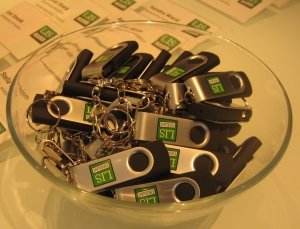
Highly sought-after DREaM data sticks
- “A fantastic day”
- “Excellent programme, good turn-out, very successful day”
- “An excellent and informative day”
- “Excellent as always”
- “Fantastic conference”
- “A great day”
- “Fab event”
- “Enjoyable and interesting”
- “A very valuable project”
Many expressed their appreciation of the event online, commenting publicly on Twitter using the conference hashtag #lis_dream5, or by e-mail. Comments included:
- “Terrific day”
- “Very enjoyable”
- “An excellent and inspiring conference”.
In the middle of the day one delegate on Twitter even confessed “Hope everyone is enjoying #lis_dream5 as much as we are! It’s been so engaging we forgot to tweet!”
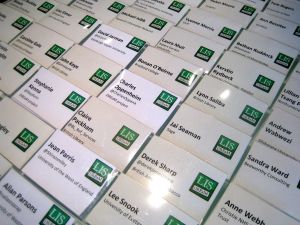
93 participants signed up for the DREaM concluding conference
In total 93 delegates signed up for the event. The majority of delegates came from academic institutions where they work as researchers, PhD students, academics, practitioner researchers, and non research-active LIS practitioners with interests in research. There was representation from a variety of other sectors including library and information services (academic, public, national, and special – with particularly high numbers of healthcare and medical information professionals), recruitment, publishing, and consultancy.
All five founding members of the LIS Research Coalition (or their successor bodies in the cases of MLA and RIN) sent representatives, as did one associate member, the Strategic Health Authority Library Leads (SHALL) Group.

The stage is set for the conference
In keeping with the goal of the
DREaM project to develop a formal UK-wide network of library and information science researchers, there was a good geographic spread amongst the delegates. Individuals made the journey to London from all corners of the United Kingdom, some with very early starts from Scotland, Northern Ireland and Wales to reach the British Library for registration at 09:45. We were also pleased to welcome international delegates from as far away as Malta, Sweden, Uganda, the USA, and Australia.

Opening keynote speaker: Professor Carol Tenopir
All the formal sessions were very well received. Particularly appreciated were the opening keynote by Professor Carol Tenopir in the morning and the closing keynote by Dr Ben Goldacre in the afternoon, both of which were rated by the majority of delegates as excellent. Although the context of each of the keynote speakers’ presentations was quite specific – library and information services delivery in the case of Tenopir, and medicine in that of Goldacre – their content was highly relevant to an audience interested in questions of value, processes of creating and facilitating access (or not) to evidence bases, and the role of information in decision making.
Tenopir’s references to the Lib-Value study appealed to all with an interest in concepts of value in general, as well as the value of service delivery in particular – whether this be in the context of a library, or any other service where the issue of value measurement is thwart with difficulties, yet politically very important. Tenopir’s presentation was both engaging and inspirational. As one tweeter put it “Inspiring stuff from Carol Tenopir! Given me good ideas for thinking about researching & demonstrating value.”
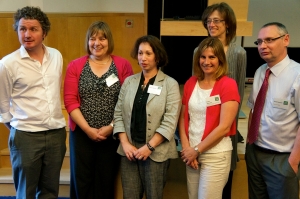
L to R: Dr Ben Goldacre (keynote speaker), Anne Webb (award winner), Dr Alison Brettle (mentor to award winners), Debra Thornton (award winner), Rosalind McNally (award winner), and David Stewart (Director of Health Libraries North West)
focus on the inadequate information architecture of scientific publishing (a legacy from the eighteenth and nineteenth centuries that is no longer fit for purpose) and its impact on patient care appealed to an audience that knows the value of information, works to facilitate access to information and knowledge, and cares about user engagement.
Goldacre extended an invitation to members of the LIS research community to lend its expertise to the projects that he has set up to bring together disparate sources of information about (1) drug trials, and (2) search strategies deployed by those looking for trials information on PubMed. This went down well with an audience interested in data mining and metadata. One tweeter noted her approval of Goldacre’s declaration of his interests: “”I’m a very dorky Doctor” @bengoldacre just told us … in the right company with the “geeky librarian” crew at #lis_dream5 therefore!” If you would like to find out more about contributing to Goldacre’s projects, please e-mail him at ben@badscience.net.
As well as delivering the last of the formal DREaM conference sessions, Goldacre also presented certificates to those winners of the LIS Practitioner Researcher Excellence Award who were able to attend the conference. The award presentation ceremony was hosted by Dr Michael Jubb, Chair of the Board of Directors of the Library and Information Science Research Coalition.
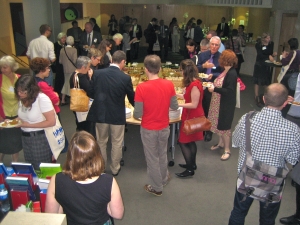
Networking at lunch
Most delegates rated the
One Minute Madness session as excellent. The twenty highly-entertaining 60 second presentations by brave delegate volunteers covered a wide range of topics. The majority were related to initiatives to improve the dissemination of LIS research. For example Alison Brettle spoke about the use of evidence summaries, University of Northampton staff described practitioner researcher support at their institution, Kerstin Rydbeck discussed the involvement of masters students in “research nodes”, and Maja Ilievska outlined her plans for an LIS research linking system prototype.
Others spoke about on-going research projects in which they are involved, for example on the role of public libraries (Anthony McKweon and Paul McCloskey), augumented reality in teaching and learning (Bethan Ruddock), and digital preservation (Rossitza Atanssova).
In the remainder of One Minute Madness slots individuals took the opportunity to pass on news to their fellow delegates. For example, Louise Doolan introduced the CILIP information literacy group, and Milena Dobreva promoted the publication of a new book on user studies for digital libraries that she has just co-edited.

Andrew Wabwezi and David Haynes at the networking drinks reception
All the
One Minute Madness presentations were expertly chaired by
Mike Clarke of the London Borough Camden. Mike kept his beady eye on clock as it counted down to zero towards the end of each presentation. The speakers did really well with their timings and we only got to hear the horn a couple of times. One tweeter noted her approval of the whole process: “Minute madness is excellent concept – must remember it. Great way to highlight so many things”.
If you’re interested in how to set up a One Minute Madness session for an event that you are organising, please take at look at our hints and tips on the format. We put these together after our first experience of such a session at the LIS Research Coalition conference in 2010.

Rossitza Atanassova and Matthew Dovey chat with Ben Goldacre at the networking drinks reception
The value of this session coming just before the lunch break was soon reaped by delegates who sought out one another on the basis of what they had just heard in the presentations. Anthony McKweon writes about his experience of this in
his review of the conference posted to the
DREaM online community.
The conversations continued at the British Library in the afternoon break, and at the networking drinks reception at the end of the day. We hope that they have already extended beyond the venue as a result of contacts being shared and forged at the conference.
Three of the formal conference sessions related directly to the DREaM project itself:
Professor Hazel Hall’s introduction to the conference,
Dr Louise Cooke’s presentation on the social network analysis of the
DREaM project workshop cadre, and the afternoon
panel session chaired by
Professor Charles Oppenheim. Each of these sessions was rated by the majority of delegates as excellent or very good.
Cooke’s social network analysis of the DREaM workshop cadre demonstrated that the DREaM project has met its main goal of developing a network of UK LIS researchers. Equally Hall gave evidence in her presentation of addressing the aims of building research capability and capacity, and raising standards. So the project shows success, but what happens next? Has the DREaM project built a solid enough foundation for the long-term support of LIS research?
John Dolan, Louise Cooke, Carol Tenopir and Jo Alcock discussed these themes, with contributions from the audience, in the panel session. Clearly a 45-minute slot is not long enough to discuss these questions in detail, but some key issues emerged from the contributions of the panel members and the audience. These included the need for:
- the success of the DREaM project to date to extend to a greater population and include more involvement of those from sectors under-represented at the concluding conference – notably public librarians, but also those working in specialist information units in the corporate sector;
- professional bodies to assess their role in promoting research, for example in embedding research training into professional skills sets and serving as a hub for research activities in the domain;
- further face-to-face meetings between researchers and practitioners to strengthen relationships and narrow the gaps between different LIS communities.
These will be taken into account as those behind the DREaM project prepare a bid for follow-on funding. It is hoped that this bid will be successful, not least because delegate feedback from this event shows a strong appetite for the network to continue (echoing similar feedback from the last of the three DREaM workshops). Comments on the delegate forms included:
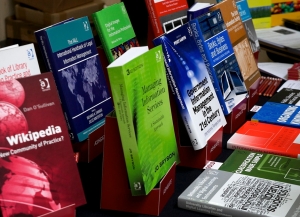
Ashgate’s stand at the conference exhibition
- “I can’t say how much I have enjoyed and appreciated being part of DREaM. Well done to all involved and I hope that a way is found to keep the network and resources going.”
- “[I] hope we can continue the enthusiasm.”
- “The job of DREaM is not finished… the work so far deserves praise.”
- “Good luck in securing ongoing funding for face-to-face networking opportunities.”
- “I would like to see more collaboration across sectors.”
The new bid will also take into account comments on the need for empirical work to explore changes in structures or practices to improve the LIS research environment (for example, for senior management buy-in). It will also draw attention to the DREaM approach as a model for fostering networking and knowledge sharing, as evidenced in the following comments on the delegate feedback forms from the conference:
- “Great opportunity to catch up with colleagues and meet new colleagues.”
- “The conference was a good networking opportunity.”
- “A great day – a chance to learn and meet some experts, and to share interests and ideas.”
(This was also discussed at the QQML conference in May by colleagues from other countries who wished to import the DREaM approach.)
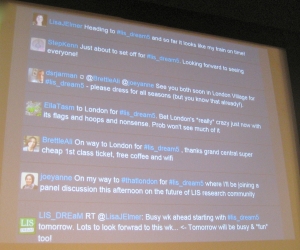
Early posts to the DREaM conference Twitter wall
It should be emphasised that the networking at this event extended beyond the conference venue itself (as has been the case of all DREaM project events). A number of people followed the proceedings remotely, some regretting that they could not be there in person. The following views were expressed by remote followers on Twitter:
- “I’m also very jealous of all those at #lis_dream5 today. Need to somehow achieve my goal of being a LIS research person”
- “Following #lis_dream5 from too big a distance… Couldn’t make it this year unfortunately.”
- “Missing #lis_dream5 in #thatLondon today, but will try to keep an eye on the tweetage…”
- “Looks like an interesting day at #lis_dream5 – please keep the tweet updates coming – much appreciated!”
As might be expected, our top tweeters were @LIS_DREaM and @LISResearch thanks to the efforts of Kirsty Pitkin and Stephanie Kenna. The others who used the conference hashtag #lis_dream5 most frequently were Bethan Ruddock (@bethanar), Rossitza Atanassova (@RossiAtanassova), Jo Alcock (@joeyanne), and Alison Brettle (@BrettleAli).

David Jarman, Milena Dobreva and Rossitza Atanassova pack up at the end of a successful day at the conference
We’d like to thanks everyone who was involved in the success of the DREaM concluding conference, including the advisory board members (especially Christine Irving and Rossitza Atanssova), Kirsty Pitkin for her event amplification services, all the speakers, and the sponsors. We are particularly grateful for the thoughtful feedback on the concluding conference itself, and the project as a whole. If you would like to contribute more to the discussion, please use the comment box below, or start a new thread in the DREaM online community.
Jo Alcock has also reopened the survey that she set up in advance of taking part in the panel session. If you have opinions on the future of LIS research, she would love to hear from you.
In the meantime, you may like to review the conference materials:
